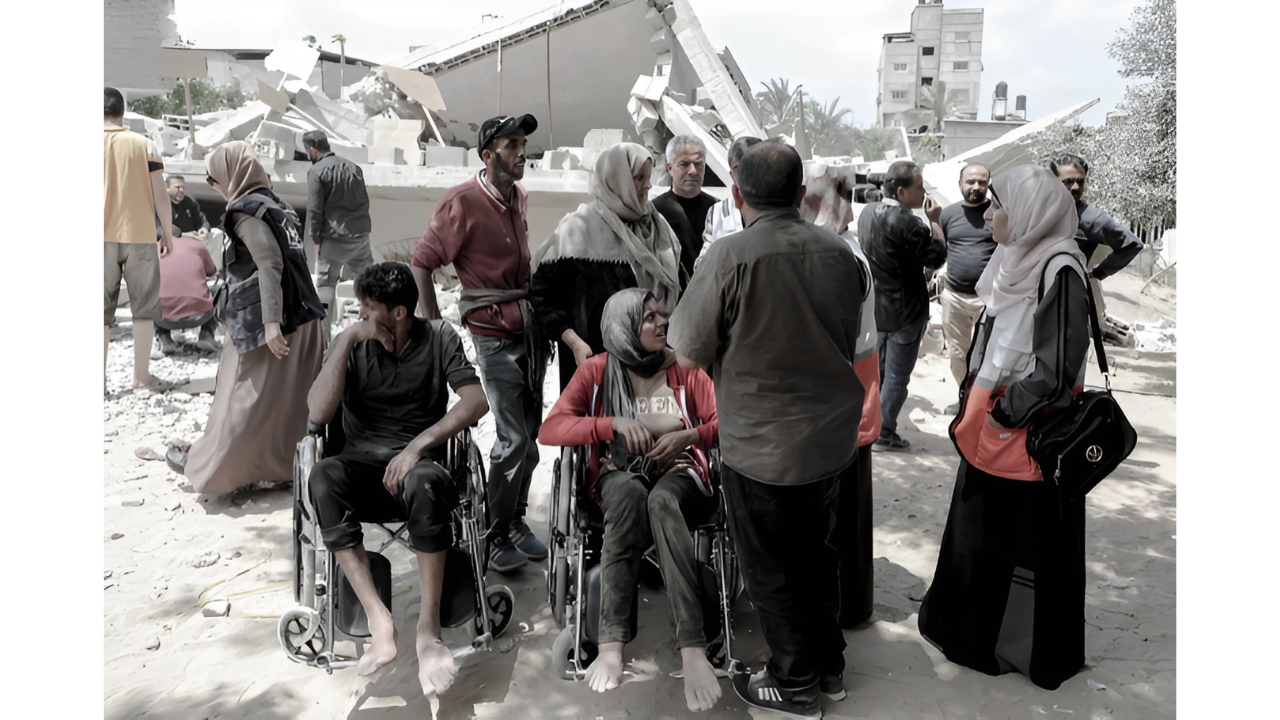GENEVA – One year into the ruthless military assault by Israel in Gaza, UN experts warned today that Palestinians with disabilities face unbearable protection risks, including inescapable death and injuries, amid indiscriminate attacks by Israeli occupation forces which have destroyed critical infrastructure, and annihilated the possibility of humanitarian assistance.
“A tragedy within a tragedy is taking place in Gaza, where Israel’s genocidal campaign has left persons with disabilities completely unprotected. Persons with disabilities are being killed and injured by indiscriminate attacks despite posing no security threat, epitomising the deliberate assault on civilians by Israel,” the experts said.
The experts noted that multiple evacuation orders totally disregarded persons with disabilities who often face extreme difficulties to follow or understand instructions. “They were in the impossible situation of either leaving their houses and the assistive devices they require to survive or staying behind without their families and caregivers and being exposed to a heightened risk of being killed,” they said. “During evacuation attempts, women and girls with disabilities are particularly exposed to increased dangers and further trauma.”
According to the experts, there are no safe places for the over 1.9 million civilians forcibly displaced in Gaza, but overcrowded shelters which are routinely subject to indiscriminate attacks, are particularly unsafe and inaccessible to displaced Palestinians with disabilities. They lack adequate hygiene and sanitary facilities, drinking water, food, and other objects essential for their life. Physical, informational, and communicational barriers make it next to impossible for persons with disabilities to access the extremely scarce humanitarian assistance available, with women and girls with disabilities facing compounded challenges that further isolate them, the experts warned.
“With the health system in Gaza decimated and medical supplies unavailable, Israeli authorities have refused to establish a system for medical evacuations nor allowed life-saving support, so that thousands of persons with disabilities, especially children, can obtain the assistance they desperately need. People with disabilities require specialised medical supplies,” the experts said.
They warned that Palestinians with disabilities, including children, women, girls and older persons are facing extreme psychological harm and trauma, and that persons with intellectual and psychosocial disabilities are also in immensely vulnerable situations.
“Many of the almost 100,000 injured Palestinians in Gaza will acquire long-lasting impairments requiring rehabilitation, assistive devices, psychosocial support and other services that are severely lacking,” they said. “The impact extends beyond physical injuries, with grave emotional and psychological traumas and wider effects on the social fabric and needs of families and communities, especially impacting women who often bear the brunt of caregiving.”
Referring to the situation of escalating violence by illegal Israeli settlers and Israeli forces, mass destruction of homes and roads, and movement restrictions in the West Bank and Jerusalem, the experts warned that Palestinians with disabilities in those occupied territories cannot access health, rehabilitation, and other essential services.
“Over the past year, Israel has been in breach of its obligations under international humanitarian and human rights law, including the Convention on the Rights of Persons with Disabilities, to take all necessary measures to ensure the protection and safety of persons with disabilities in situations of risk, including armed conflict,” the experts said.
Parties to the conflict must immediately accept a ceasefire, they said. The experts also recalled the International Court of Justice (ICJ) Advisory Opinion of July 2024, which declared Israel’s continued presence in the occupied Palestinian territory unlawful, amounting to racial segregation and apartheid.
“Israel must comply with its international obligations and the provisional measures ordered by the ICJ regarding its conduct in Gaza that aim at preventing further acts of genocide,” the experts said. “Israel must also fully and effectively cooperate with international investigations and preserve evidence, particularly in relation to violations of the rights of persons with disabilities.”
The experts have previously raised these concerns with the Government of Israel.
The experts: Heba Hagrass, Special Rapporteur on the rights of persons with disabilities; Francesca Albanese, Special Rapporteur on the situation of human rights in the Palestinian territories occupied since 1967; Paula Gaviria Betancur, Special Rapporteur on the human rights of internally displaced persons; Michael Fakhri, Special Rapporteur on the right to food; Pedro Arrojo-Agudo, Special Rapporteur on the human rights to safe drinking water and sanitation; Balakrishnan Rajagopal, Special Rapporteur on the Right to adequate housing; Reem Alsalem, Special Rapporteur on violence against women and girls, its causes and consequences; Tlaleng Mofokeng, Special Rapporteur on the right of everyone to the enjoyment of the highest attainable standard of physical and mental health;Laura Nyirinkindi (Chair), Claudia Flores (Vice-Chair), Dorothy Estrada Tanck, Ivana Krstić, and Haina Lu, Working group on discrimination against women and girls; Farida Shaheed, Special Rapporteur on the right to education.
The Special Rapporteurs are part of what is known as the Special Procedures of the Human Rights Council. Comprising the largest body of independent experts in the UN Human Rights system, Special Procedures is the general name of the Council's independent fact-finding and monitoring mechanisms that address either specific country situations or thematic issues in all parts of the world. Special Procedures experts work on a voluntary basis; they are not UN staff and do not receive a salary for their work. They are independent from any government or organization and serve in their individual capacity.


